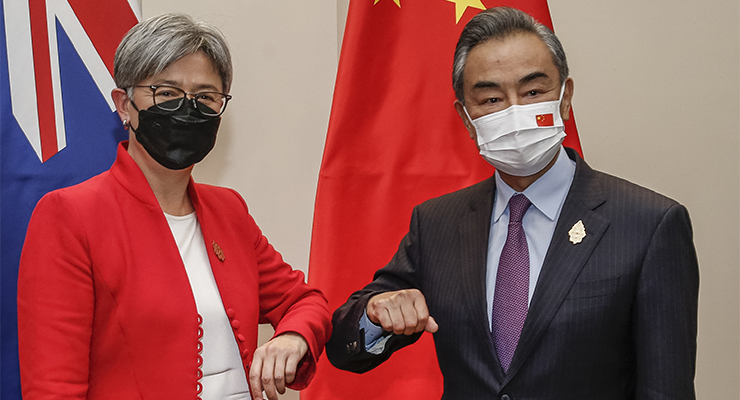
There was a collective sigh of relief in diplomatic and business circles yesterday when Foreign Affairs Minister Penny Wong announced she plans to visit Beijing on Wednesday and meet her counterpart Wang Yi for the 50th anniversary of diplomatic relations between the People’s Republic of China and Australia.
After the missteps of the Coalition years, it signals further normalising of relations between the nations. Indeed, it is encouraging just how quickly relations have warmed under the Albanese government. Ministers have resumed contact with their counterparts as Prime Minister Anthony Albanese, Wong and their cabinet colleagues have dialled down the rhetoric and returned diplomacy to the forefront.
Still, it’s important to remember that the initiative is all in Beijing’s hands, after Australia boxed itself into the freezer with China in 2017 by joining the US in containing the nation and treating it as a strategic competitor.
At the top of Wong’s agenda will be the ongoing detention of two Australians, journalist Cheng Lei and writer Yang Hengjun. Their cases will be far more difficult to resolve if they entered China on Chinese passports, as so many Chinese Australians do, despite it being technically illegal for Chinese people to have dual nationality.
Another focus of the exchange will be various trade disputes: China is blocking major Australian exports, including wine, barley and coal, and Australia has taken China to the World Trade Organization over sanctions. Still, this has hardly slowed down the big picture, with commodities prices having surged and Australia’s exports to China having jumped 24% to $180 million in the year to August.
Strategic issues will also loom large over the meeting. Wong’s China visit comes hot on the heels of the annual Australia-US Ministerial Consultations (AUSMIN) talks in Washington between Wong, Defence Minister Richard Marles and their US counterparts, Secretary of State Antony Blinken and Defence Secretary Lloyd Austin.
Here many warm words were spilled about the Australia-US alliance, the AUKUS agreement and the Quad Alliance, much pilloried by Beijing, as promises were made to “deepen” the alliance, such as by stationing more US forces in Australia and drawing Japan in for joint drills.
“The United States and Australia share a vision of a region where countries can determine their own futures,” Austin said after the meeting.
“Unfortunately, that vision is being challenged today. China’s dangerous and coercive actions throughout the Indo-Pacific, including around Taiwan, and toward the Pacific Island countries and in the East and South China Seas, threaten regional peace and stability.”
On cue just a week later, Japan announced its biggest military upgrade since World War II, unveiling plans to double its defence spending to US$320 billion (A$477 billion), or 2% of its gross domestic product (GDP), over the next five years.
Wong’s visit also comes at a time when border tensions between China and India, Australia’s partner in the Quad Alliance, are once more on the rise.
Less impressive than Wong’s latest surefooted step is the planned visit to China by the Business Council of Australia (BCA) and a conga line of Australia’s highest-paid chief executives, as told rather breathlessly by The Australian.
The advertised line-up looked tired and almost last century. The chiefs of Australia’s big four banks have variously pulled out of even halfway-serious business in China, while Qantas CEO Alan Joyce’s main interest in the nation is getting his code-share deal with China Eastern Airlines renewed by the competition watchdog.
The big miners can continue simply doing their thing — they don’t need to be on a delegation, the door is open for them any time. And mining aside, Australia’s biggest corporations have put China in the too-hard basket; under President Xi Jinping, conditions for foreign business insiders have deteriorated, quite apart from the recent years of pandemic lockdowns and quarantine.
And then there is the elephant in the room. It is too early to understand the effect of China’s rapid volte-face on its COVID policy from zero-COVID lockdown and testing regime to an apparent let-it-rip attitude, beyond the fact that it will severely test the country’s leadership. And the antiseptic, tightly choreographed nature of official visits to China will leave Wong with no scope to venture into the real Beijing.
What we do know is that three years after the outbreak in Wuhan began, China is once more the global epicentre of the disease as it sweeps through the population largely for the first time. There are reports of hospitals being overwhelmed, crematoriums operating 24/7, and China factories, so essential in global supply chains, struggling to muster sufficient workers.
Gough Whitlam’s move to open diplomatic relations with China in 1972 was the right one, and Wong’s visit will be a decent bookend, laying the groundwork for a visit by Albanese in 2023 and hopefully closing the chapter on a rough patch in a relationship that won’t be easy to manage in the foreseeable future.








Hopefully ameliorating the Morrison – Payne clumsy dog whistling
Two politicians. Bumping elbows. Wearing masks. That sums the whole thing up. China is not giving up anything.
And what is Australia prepared to give up?
Dutton in a straight-jacket?
They don’t want him either.
That should be $180 billion, not million. They’re different.
The intro to this article reads: “ After years of Coalition government, Australia’s relationship with China is pretty frosty”. This seems partisan. The relationship is frosty for a few reasons but the wording implies the source/cause is the coalition government. The CCP has taken some steps – deliberately it seems – to cool relations with the west – not just the coalition led Australian government. I would prefer to read articles with less personal opinion in the headline (or in the article itself). I scan the introduction paragraph of articles and am likely to pass on an article that begins with too much personal opinion – especially when it is so clearly partisan. Keep it real guys.